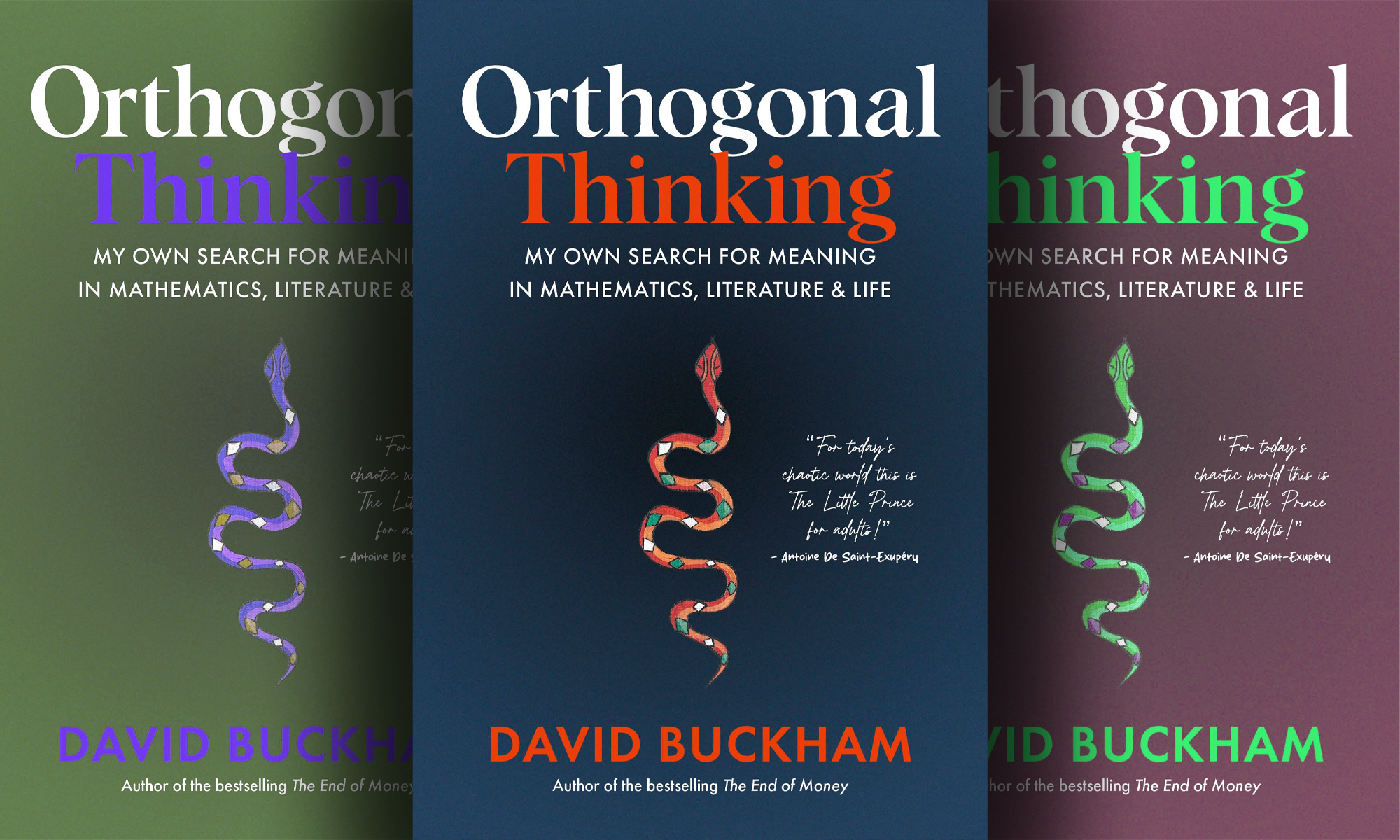First, the title: in the realm of mathematics, orthogonal has a narrow meaning, referring to points intersecting or lying at right angles. Expand that reach a little further, however, and David Buckham’s multi-level model becomes clear: orthogonal thinking corrals unrelated perspectives to create probing and unexpected insights.
This is not a travelogue. Nor is it an autobiography, a maths primer or a self-help book.
It does have a little of all of those, however. Author of the best-selling The End of Money and The Age of Menace, Buckham moves from scrutinising international finance markets to tracking his own search for meaning.
It’s a deeply personal journey – his aim is to convey “a way of seeing things differently”.
He has roamed through many of the world’s far-flung places and interrogated many disciplines in his attempt to answer the question: Where does meaning reside?
And this is what he’s set out to portray: learnings that led him “to reach a substantial realisation”.
The breadth of his knowledge is wide, informed by a lifetime of study and far-ranging adventures, from abstract mathematics and English Literature at UCT in the 1990s to exploring the ruins on the Yucatan Peninsula and mastering the challenges of rock-climbing.
The result is a unique view of the world and of himself – his “human beingness”.
To counter what he calls today’s “giant idea trains”, freighted with pseudo information and knee-jerk un-thinking, he’s trawled through the fields of mathematics, linguistics, philosophy, literature and music. Each of these subjects considered on its own comes up short, offering paradox and contradiction… more questions than answers.
Mathematics, for example, presents monumentally difficult problems. Some remain too knotty to unravel, even after centuries of the deepest analysis – like Riemann Hypothesis, which sits at the heart of Buckham’s book.
An exploration of the distribution of prime numbers, with great influence on Number Theory, the hypothesis was first proposed in 1859 and is still neither proved nor disproved, though it has been plotted, with the aid of computers, as far as 10 trillion zeros.
For customers who are turned off by the self-help shelves in any bookstore (and therefore might not even look at this book), it’s salutary to note that the biggest self-help resource is probably literature: uncountable quantities of words through the ages that question, instruct, enlighten, entertain, move…
He swiftly dismisses both postmodernism and poststructuralism.
Under poststructuralism, where “truth” is not a fixed concept, but instead changes depending on cultural, political and social circumstances, independent thought becomes negative.
“Taken to the nth degree, it questions whether there is a single objective reality at all.”
Likewise, postmodernism is essentially nihilistic.
At UCT, studying English literature through a postmodernist lens meant that he and his cohort “learned not to love words and books and literature”. Only re-reading literature years later did he discover the timeless instruction and pleasure of reading.
Watch here: Chomsky-Foucault Debate on Power vs Justice (1971)
Peopled by luminaries as diverse as Noam Chomsky and Michel Foucault (the noise of whose 1971 debate is echoing still), Derek Walcott, John Steinbeck, Albert Camus, JM Coetzee and Stephen Watson, the book highlights a vast literary canon.
In the mix are heroes, anti-heroes, absurdists, evil-doers, men driven mad, people without conscience.
Harry Potter’s Voldemort is like Foucault, in Buckham’s view – snake-like, the embodiment of the serpent in the prelapsarian Garden. This is a comparison likely to offend Foucault fans and provoke fierce argument.
In fact, a recurring theme is the serpent, encountered in various settings, echoing the boa constrictor in Antoine Saint-Exupery’s The Little Prince, a story that significantly inspired this book. Accompanying the snake reference are thoughtful illustrations by Martine Margoles.
Buckham assumes a lot on the part of his audience.
Some of his allusions might send a bemused reader to Google (or an old-school encyclopedia): not everyone is au fait with Philip Glass’ Metamorphosis I, for example (or Pantera!), or familiar with Gauss’ number theory, or Gödel.
He’s not unduly concerned.
He wrote this book to encourage readers to “stitch together” their own experiences to create meaning that’s personal to them. But the book repays careful attention: it’s wide-ranging and rich and eloquent (at times lyrical, with language and cadences reminiscent of Alan Paton).
He does wonder whether we are “mere vessels, floating in the ether”, to almost – but not quite – grasp meaning from the void.
Nonetheless, “to abandon the search for meaning entirely and to surrender to the absurdity of life would be… at odds with our innate human nature”.
He upends the Cartesian approach from, “I think, therefore I am” to, “I am, therefore I think.”
It is when we become self-conscious that we become conscious.
Ultimately, then, it appears that he has found meaning – in the chaotic beauty and unpredictable harmony of numbers, of words, of music, of all the elements in our unplumbed, sprawling universe.
Maybe – certainly for human beings at this stage of our limited intellectual capacity to fully grasp any sort of big picture – there’s nothing more.
And it may be enough. DM
Orthogonal Thinking by David Buckham is published by Mercury Books, an imprint of Burnet Media (R285).
This article is more than a year old
South Africa
Orthogonal Thinking – The serpent, the debate and 10 trillion zeros
There’s a new book out for readers seeking meaning in today’s chaotic world.




